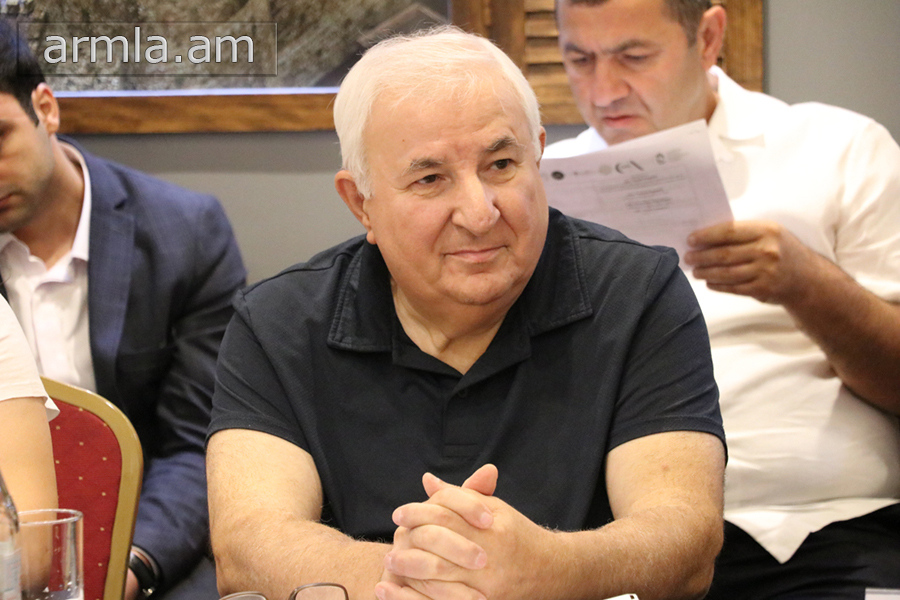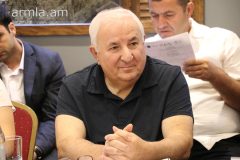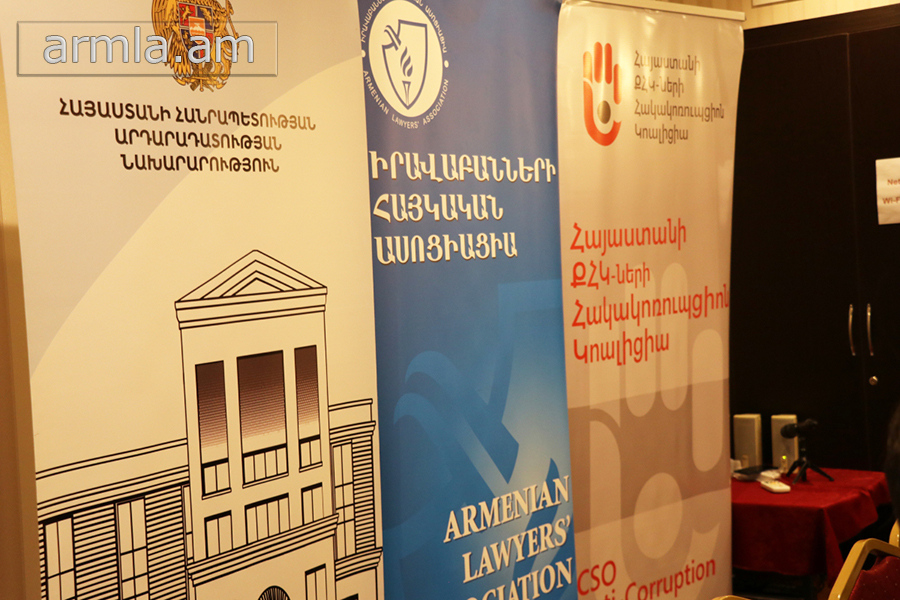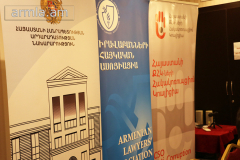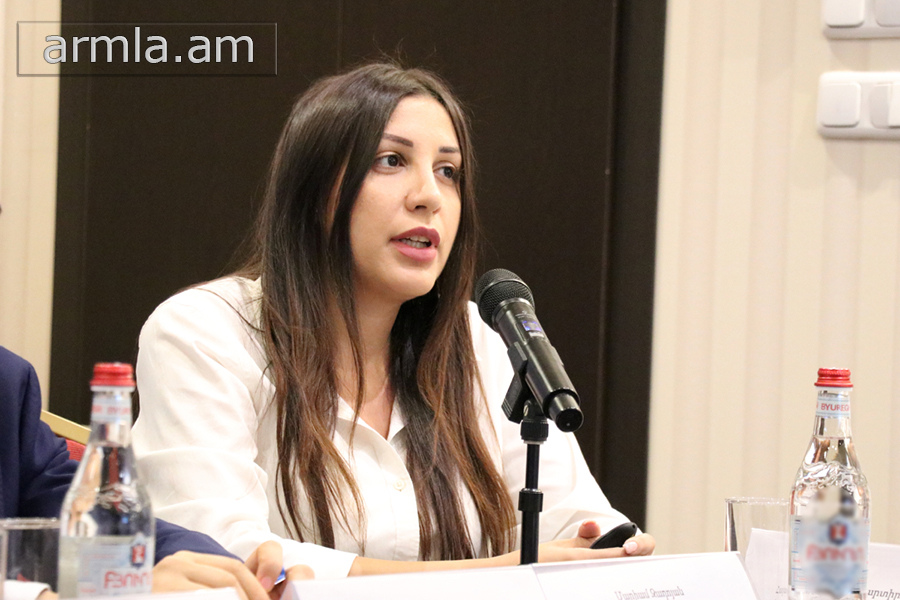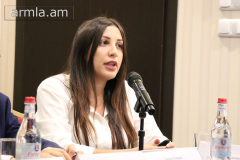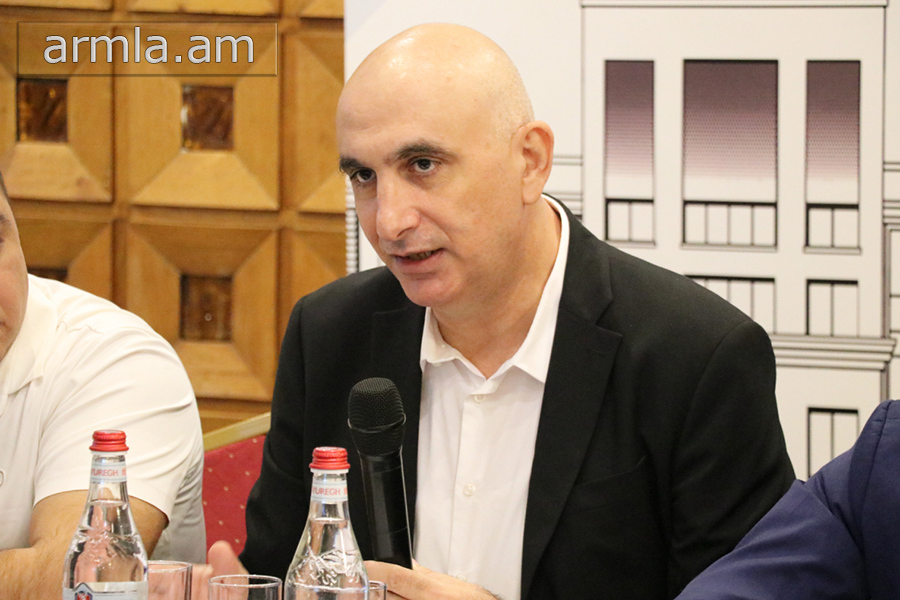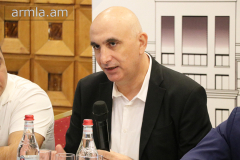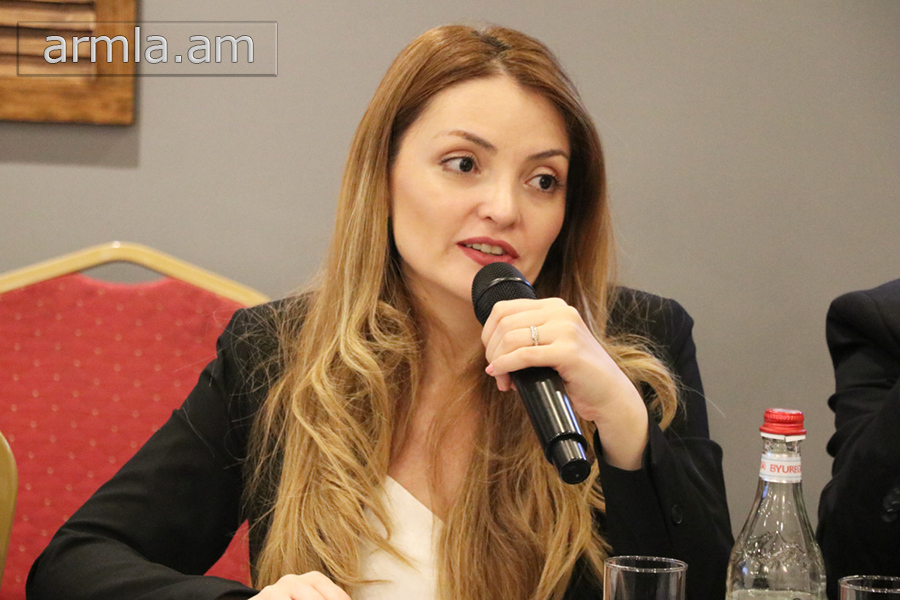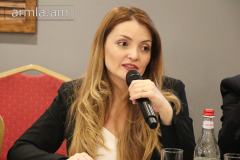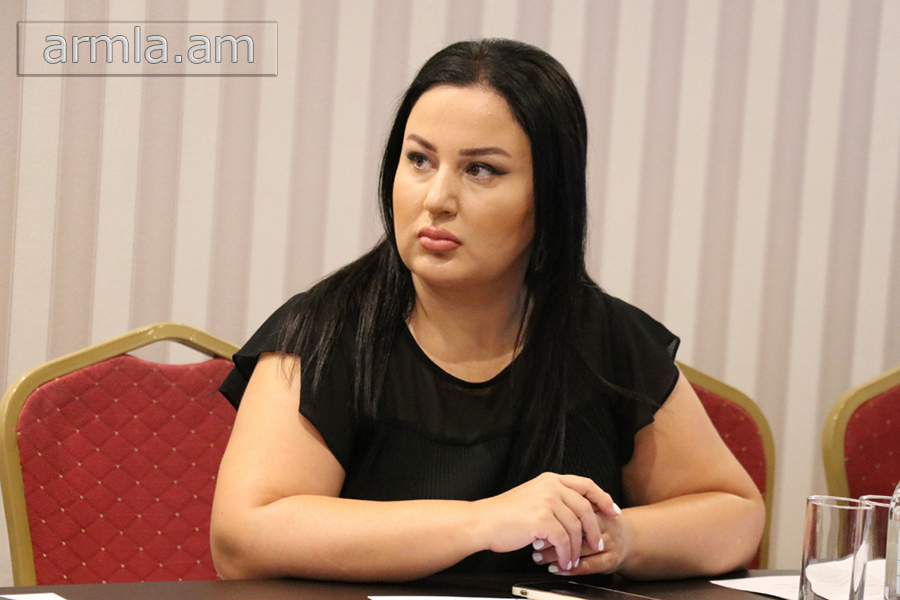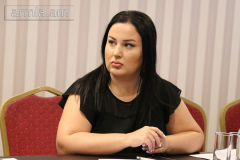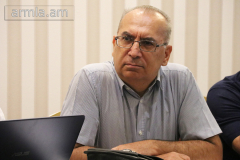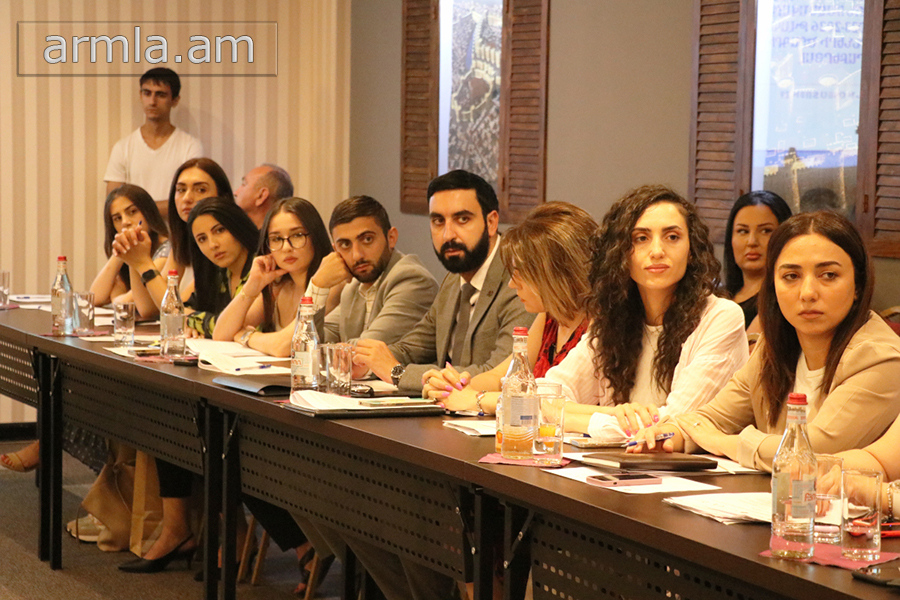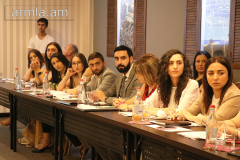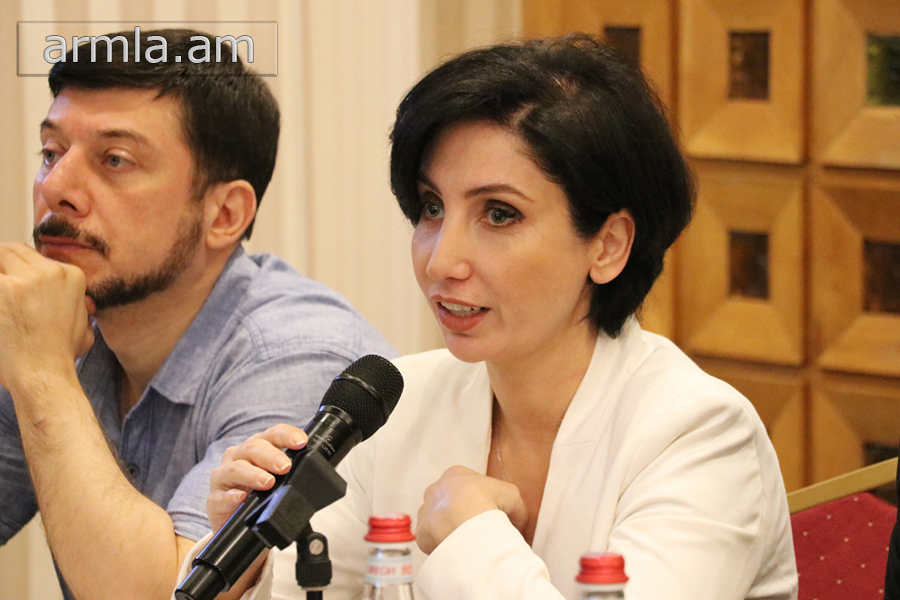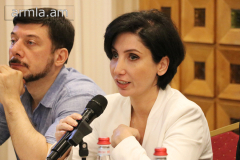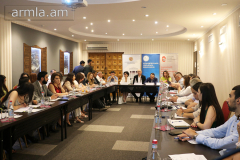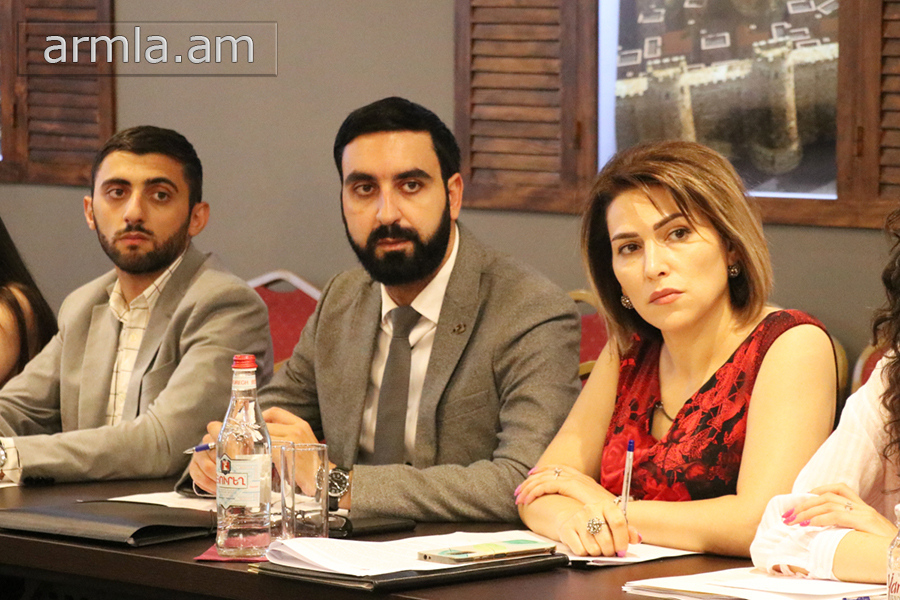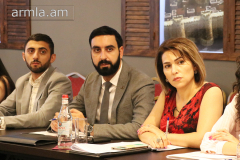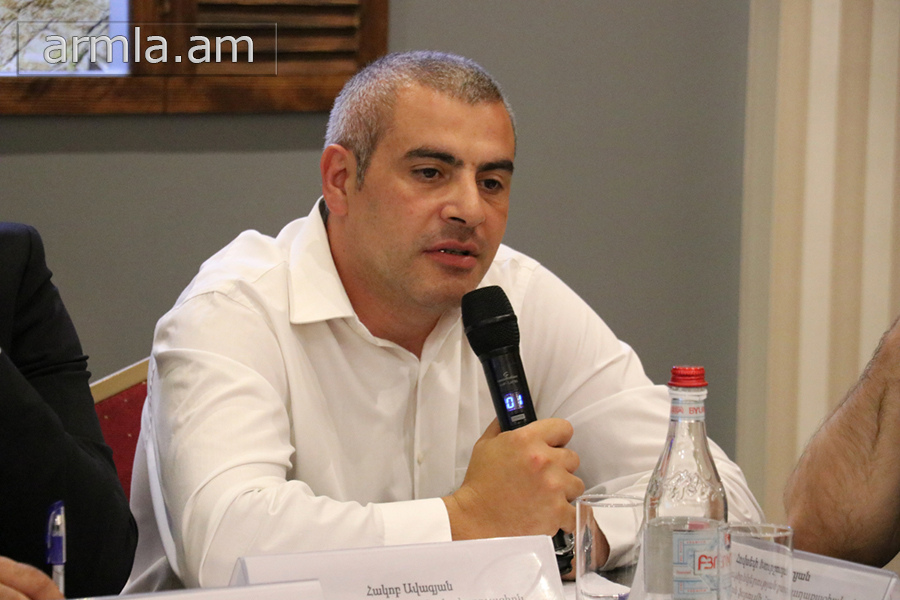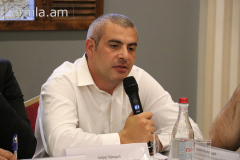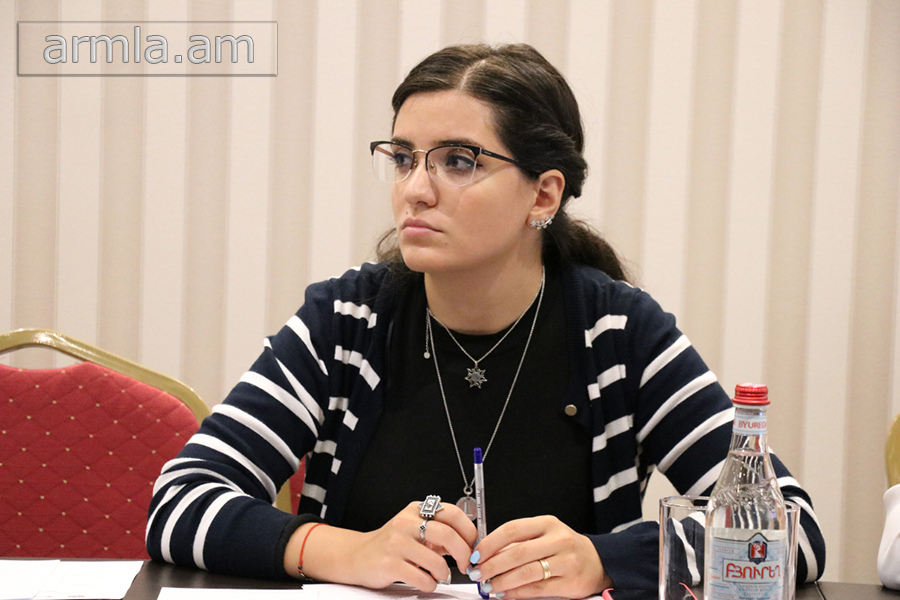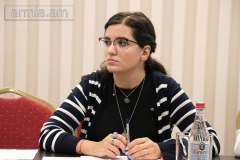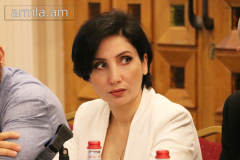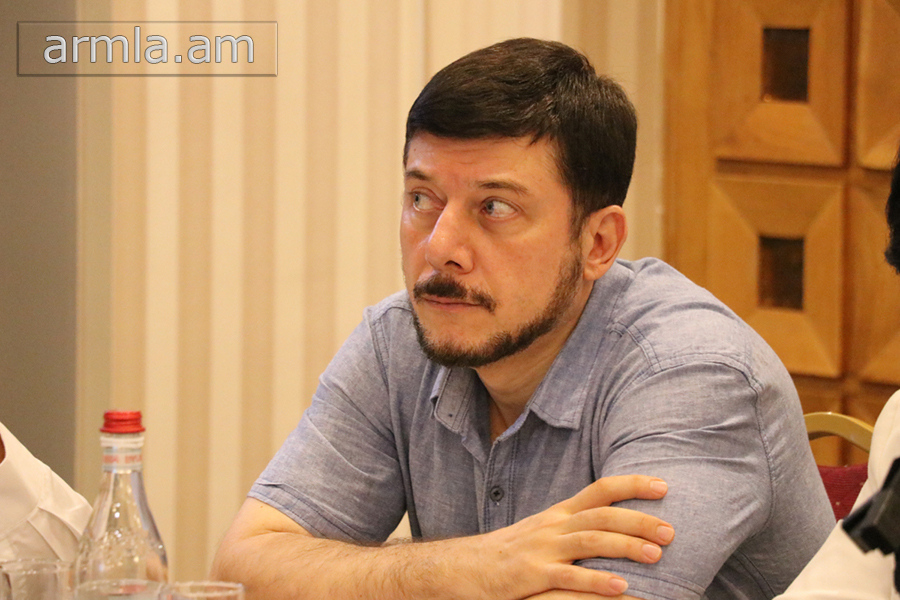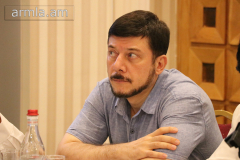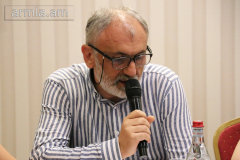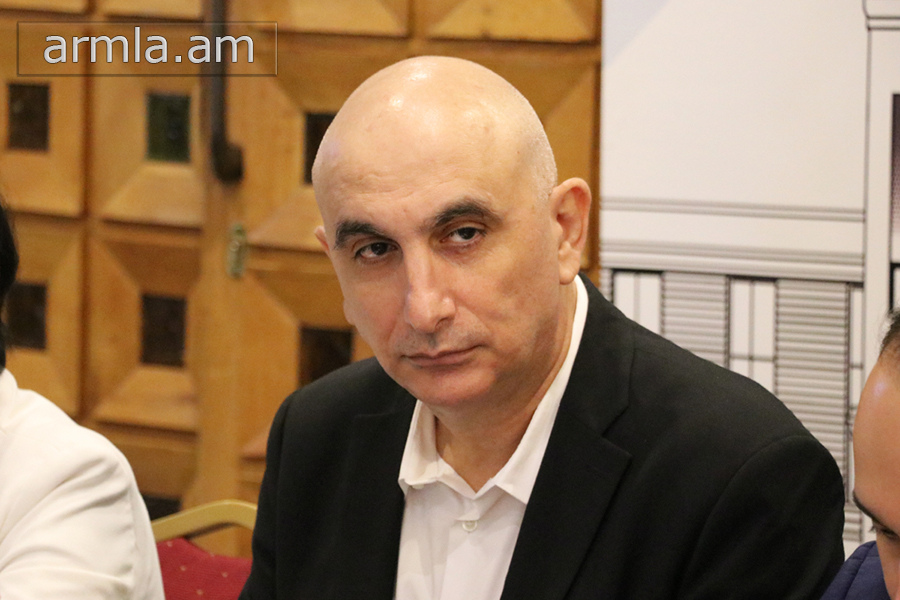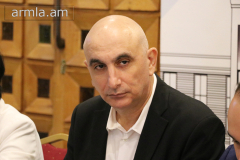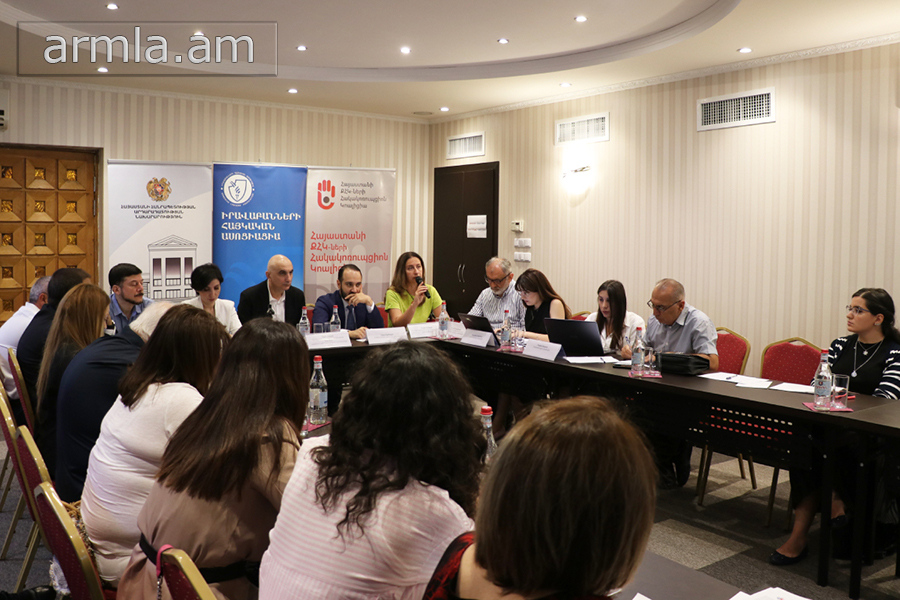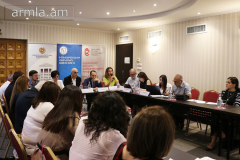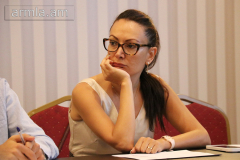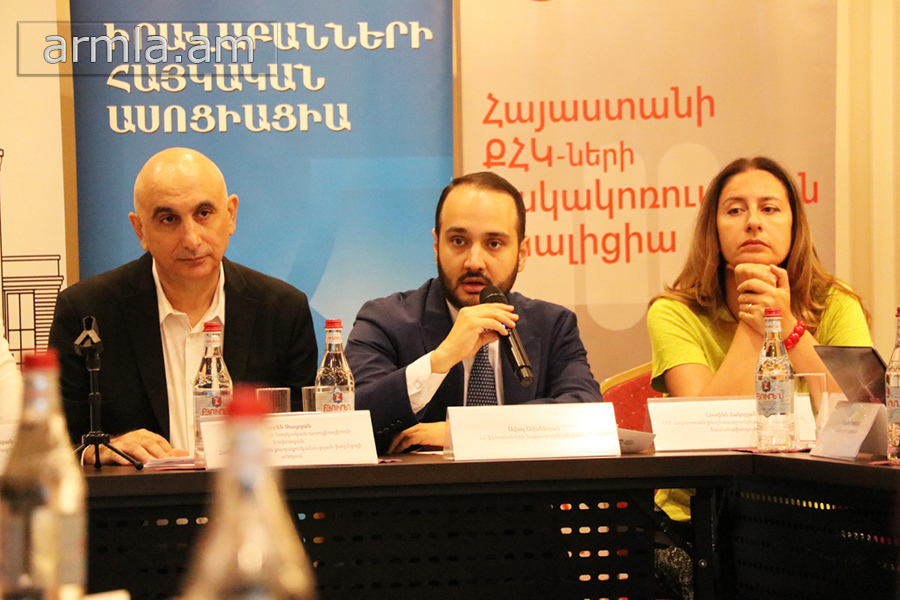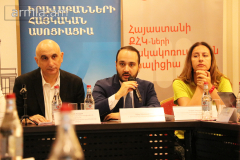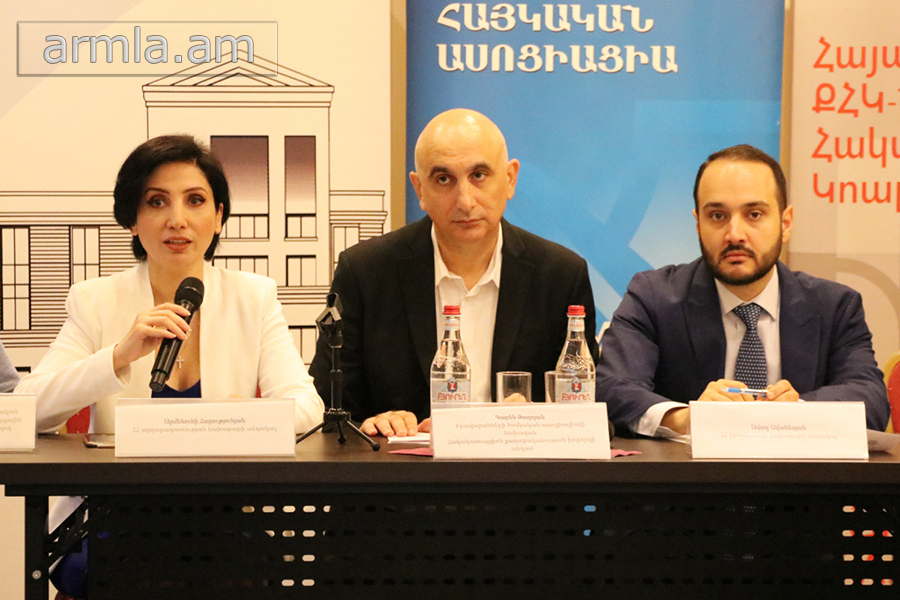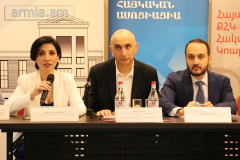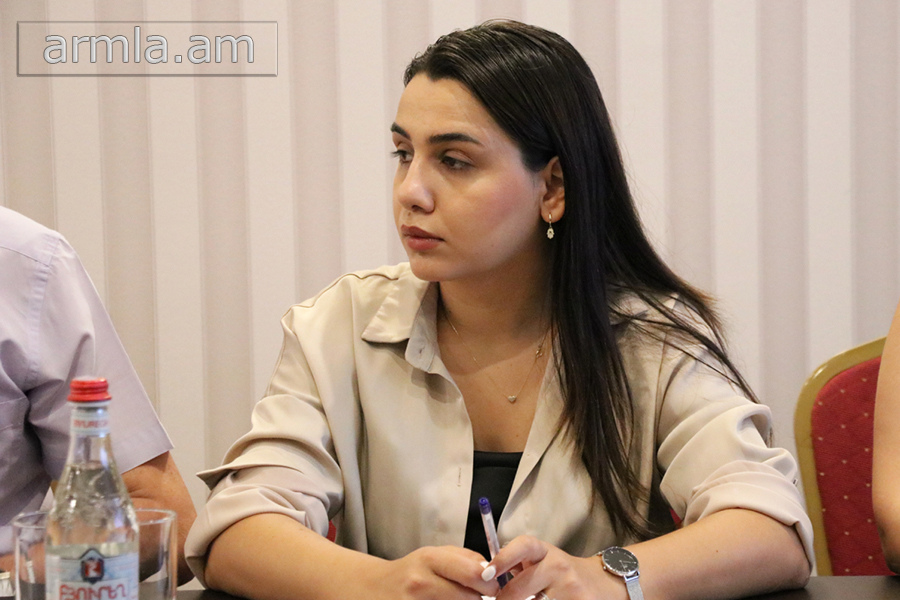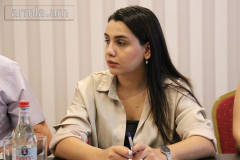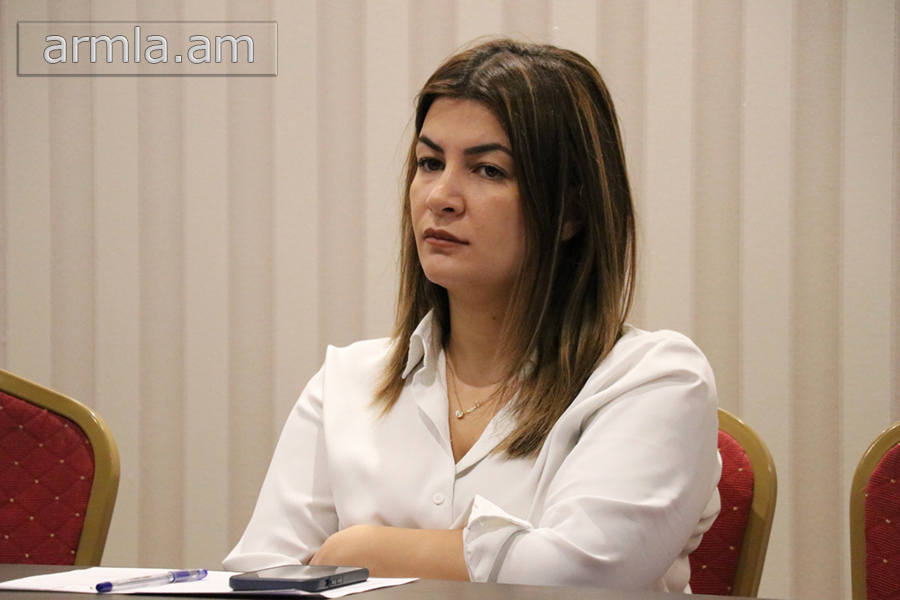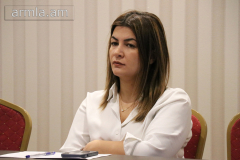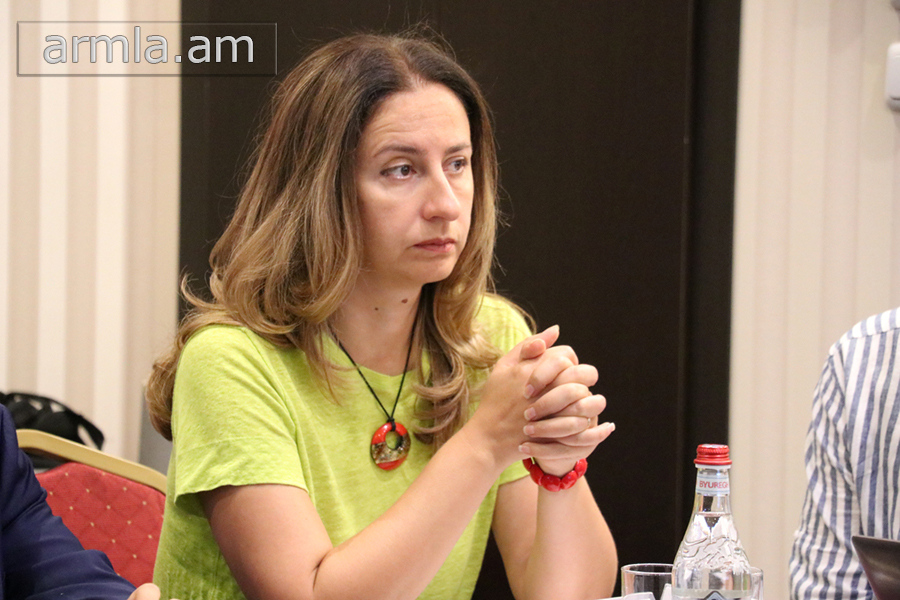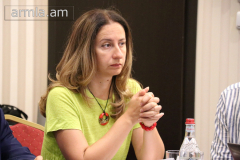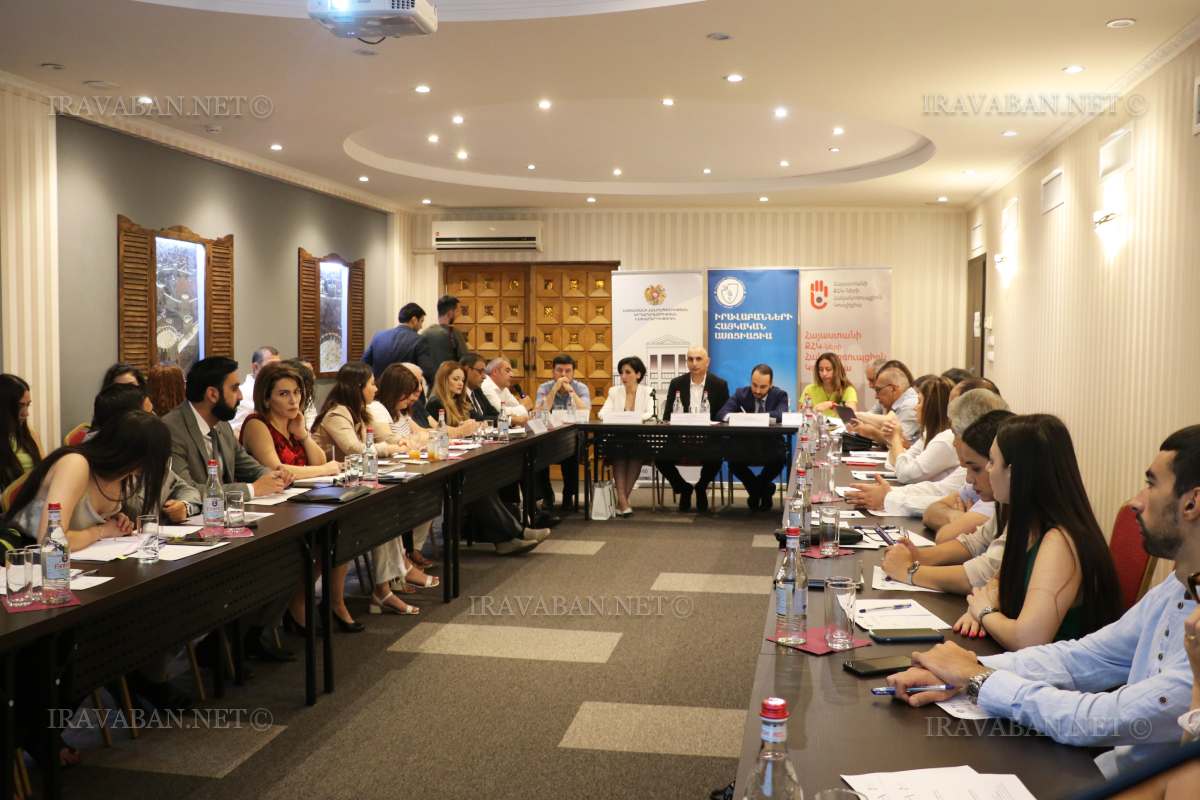
The “Armenian Lawyers’ Association” NGO, “Europe in Law Association” NGO, the Union of Manufacturers and Businessmen of Armenia, Eastern Partnership Civil Society Forum Armenian National Platform (EaP CSF ANP), the EU-Armenia Civil Society Platform, the CSO Anti-Corruption Coalition of Armenia, and the RA Ministry of Justice organized and held the public discussion of the Draft RA Anti-Corruption Strategy and Its Implementation Action Plan for 2023-2026. About 50 participants from state bodies, civil society organizations and networks, advocacy, business and anti-corruption expert community took part in the discussion. The speakers made opening remarks.
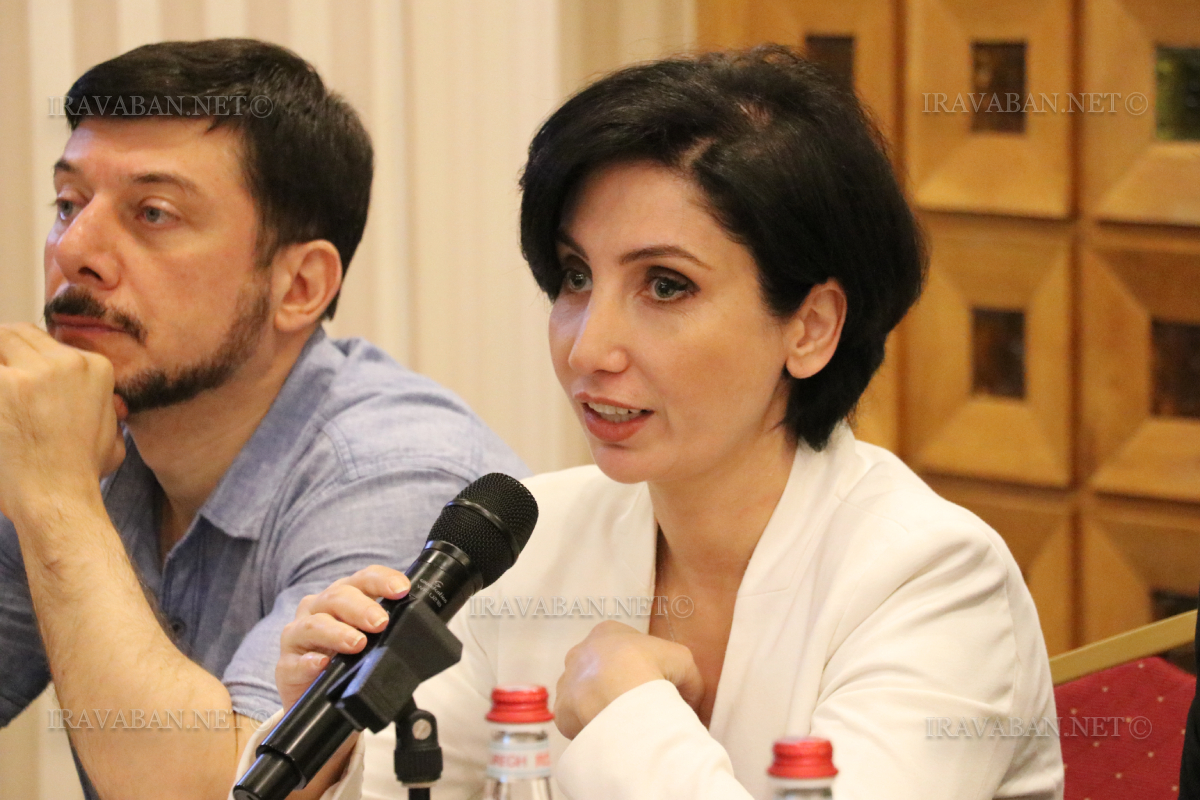
Deputy Minister of Justice Armenuhi Harutyunyan in her speech mentioned that the civil society played an active role in the development of the previous strategies and hopee that they would also play an important role in the development of the Strategy for 2023-2026.
“The real involvement of all without exceptions is necessary so that the fight against corruption becomes a reality. It is a challenge for all countries in the world and it is a constant challenge as well. It will not be possible to say that we have achieved such success that we have nothing more to do in this direction. This is one of those destinations where there will always be something to do. We will always need all of you in this matter,” the Deputy Minister said and added that she hopes to exchange ideas on the vision of the future in a constructive atmosphere.
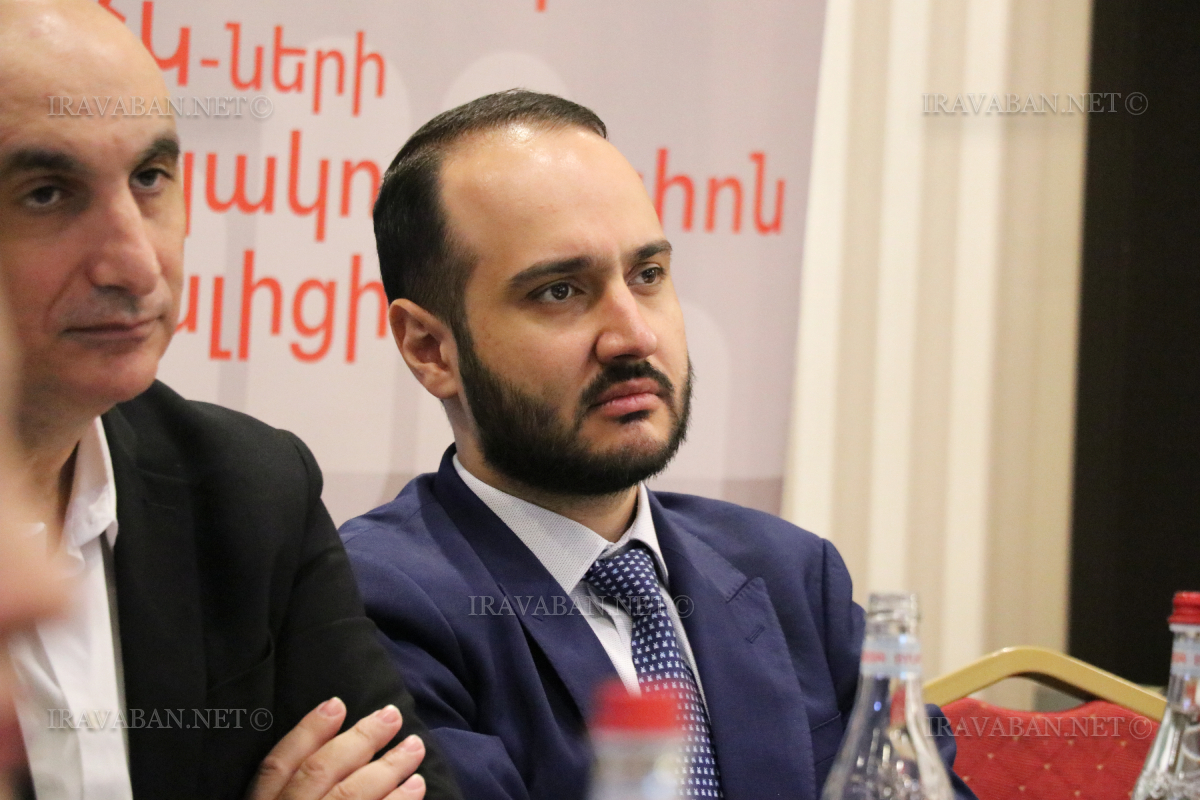
Then, the Deputy Minister of Finance Avag Avanesyan made an opening speech. He mentioned that the latest OECD studies showed that 68 percent of corruption cases in member countries of the organization are recorded in the procurement sector. The general policy of the Ministry of Finance is to ensure absolute transparency in procurement.
“Any case of corruption means a waste of hard-earned funds of RA citizens. Our goal is to identify all such cases and reduce them as much as possible. We understand that the dream that corruption cases will become 0 is almost impossible, because the developed world has not managed to solve this problem, but we must try to do it. We will continue our steps to achieve absolute transparency,” the Deputy Minister noted, adding that the ineffective implementation of the strategy will provide an opportunity to waste funds.
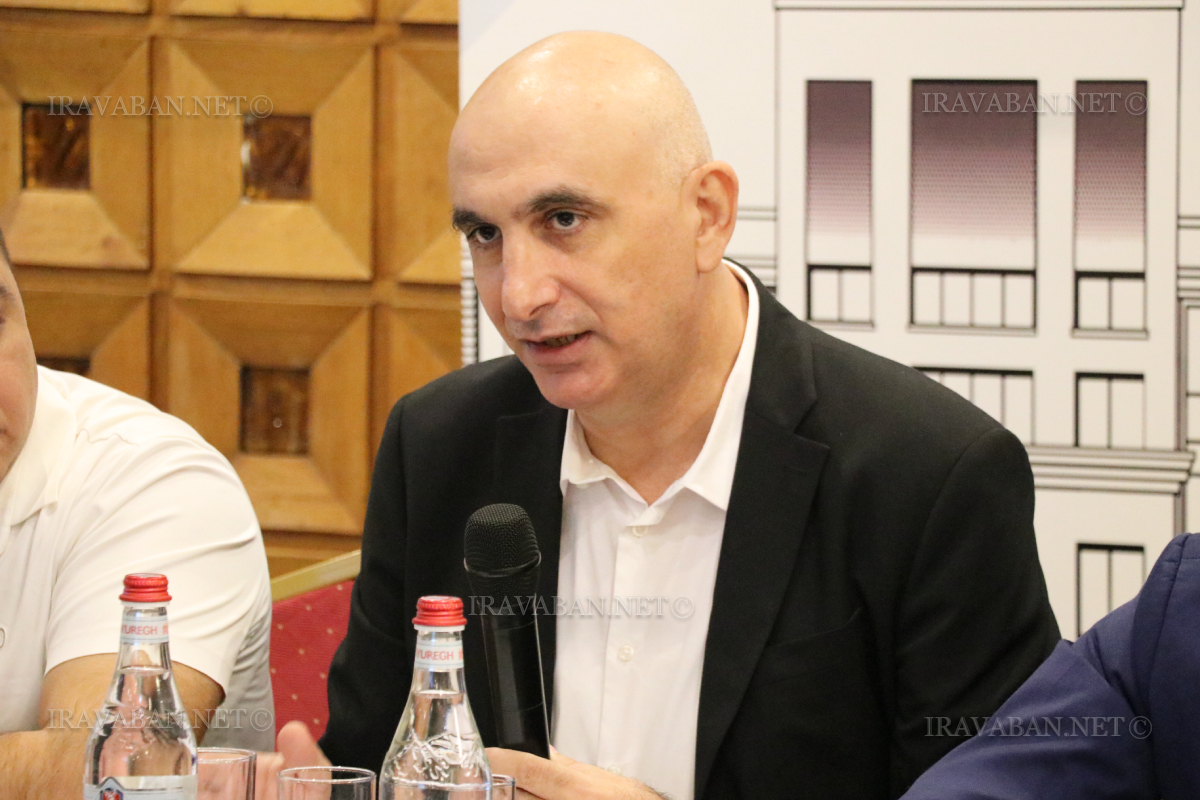
Karen Zadoyan, President of the Armenian Lawyers’ Association of, stated in his opening speech that both the organization and the partners have been and are at the root of anti-corruption reforms in the RA and it is very important for them that these reforms go in the right direction.
“The Ministry of Justice has always been our partner, regardless of the officials. We consider the Ministry as an institution. Our major achievement is the state, independent RA and the anti-corruption policy will help us to have a better management system, a corruption-free system, to have a class of public servants bearing integrity values. Our organizations and partners will be consistent; we will participate and invest our efforts in the development of the anti-corruption policy and its monitoring. There will be sharp and evidence-based criticisms aimed at making the system better,” Karen Zadoyan said, noting that they will do everything to make the implementation of the strategy a success.
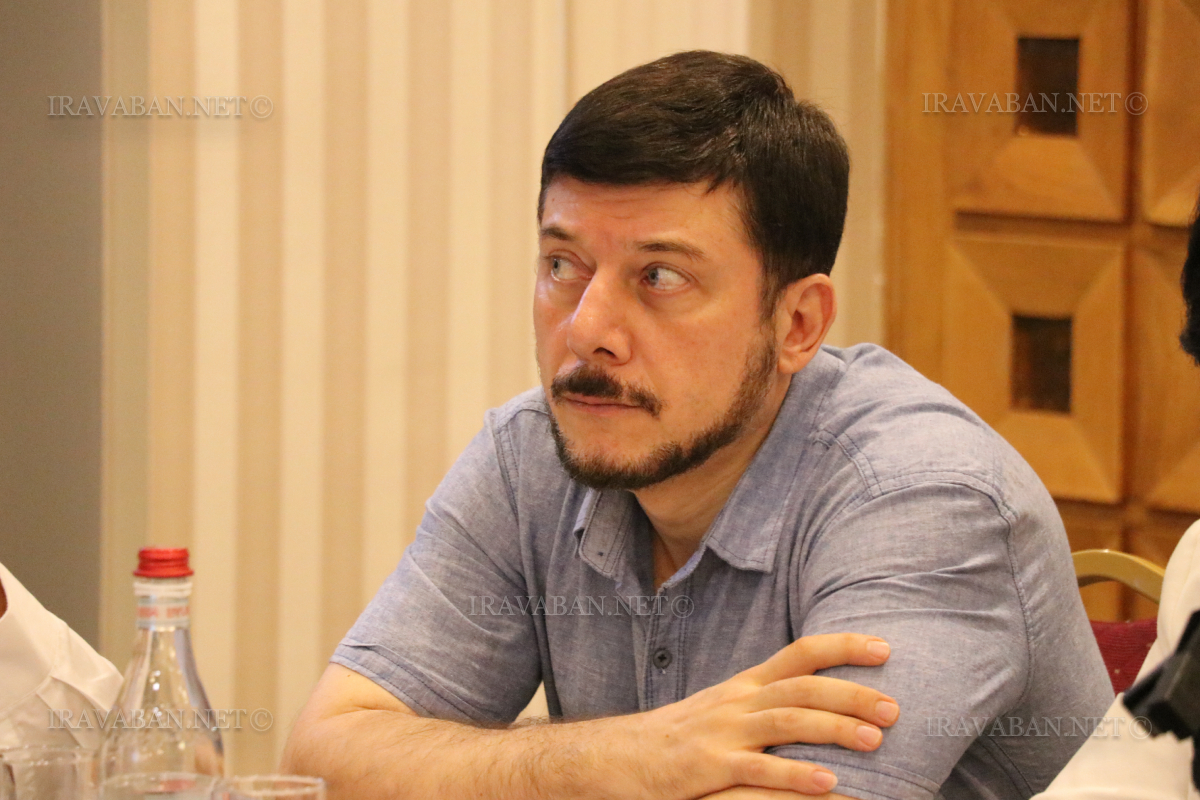
Hovsep Khurshudyan, Facilitator of the Eastern Partnership Civil Society Forum Armenian National Platform (EaP CSF ANP), highlighted the importance of the constructive dialogue and noted that the state system and representatives of the civil society should overcome all problems with joint efforts.
“The negative tendencies of the corruption perception index cause concern among the public that corruption is beginning to raise head again. It is good that corruption is not systemic, it is visible. It means that the authorities are interested in dealing with this process in cooperation with the civil society, but we shall not fail to see the dangers of this process. We have important prospects for relations with the European Union. We will not be able to achieve this without overcoming this problem. Corruption is a disease that hinders the development of all sectors of the country,” Hovsep Khurshudyan, said, stressing that the EaP CSF ANP is actively involved in the development of the strategy.
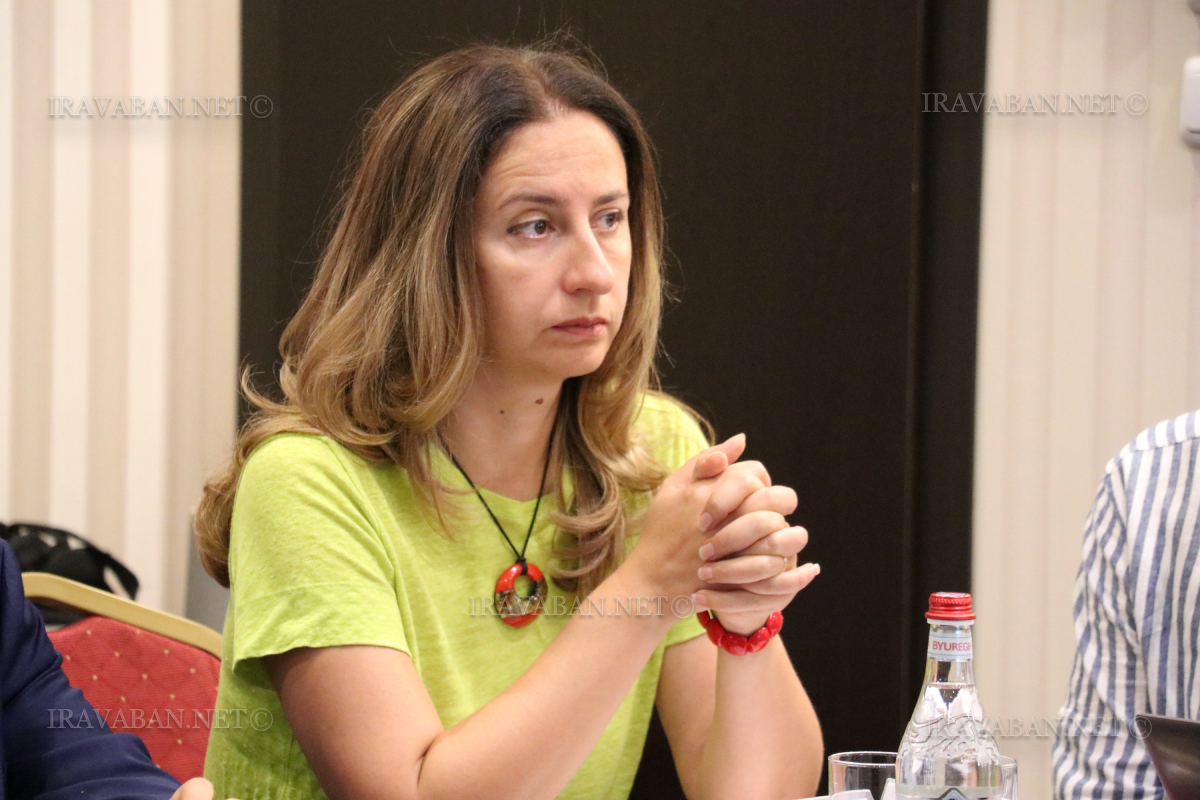
The Co-Chair of the EU-Armenia Civil Society Platform Lusine Hakobyan in her opening speech mentioned that the fight against corruption is among the priorities of their organization. The platform has already developed one advisory opinion in that field.
“We attach importance to the development and adoption of such an anti-corruption strategy, which will be as inclusive as possible, will take into account the most acute problems in the field, and will include targeted solutions for these problems. Public discussions on this topic are also important, and that is why we have initiated organizing this discussion ourselves. I urge, I call to organize public discussions through sectoral platforms, coalitions, and institutional structures representing collective power,” Lusine Hakobyan said.
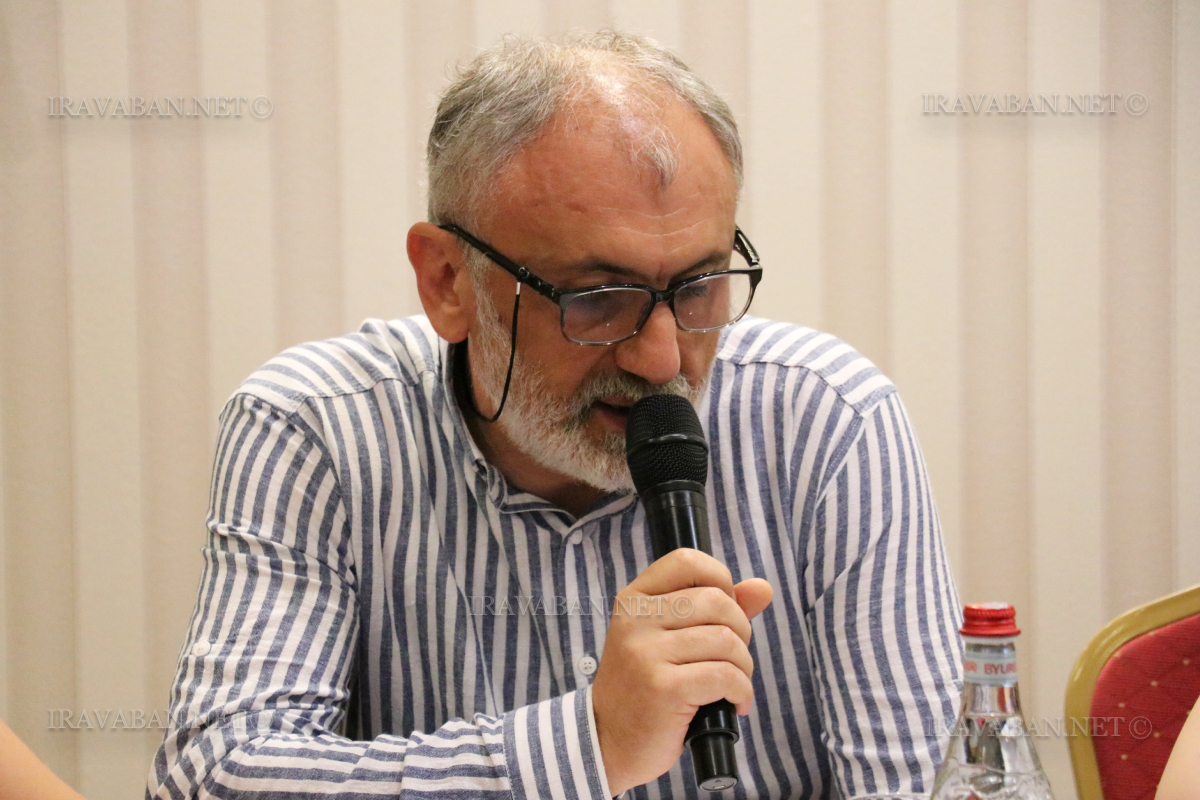
Armen Martirosyan, Vice-President of the Union of Manufacturers and Businessmen of Armenia believes that not many changes will take place in the society unless corruption becomes shameful, scary and unprofitable. According to him, bribery is the “fairest and most competitive” of corruption phenomena.
“If I want to get this or that order or license and another businessman also wants to get it, then we compete on the amount of the bribe. However, I cannot become an official’s cousin, godfather, godchild, or fellow student. I don’t praise bribery, I just want to show that these other phenomena exist and are still growing and thriving in Armenia, notwithstanding the fact that we say that the level of corruption has decreased. These other phenomena deepen. It is necessary to make an effort at the level of sacrifice, so that some actions are shameful for us,” Armen Martirosyan said, emphasizing the role of education in the fight against vicious phenomena.
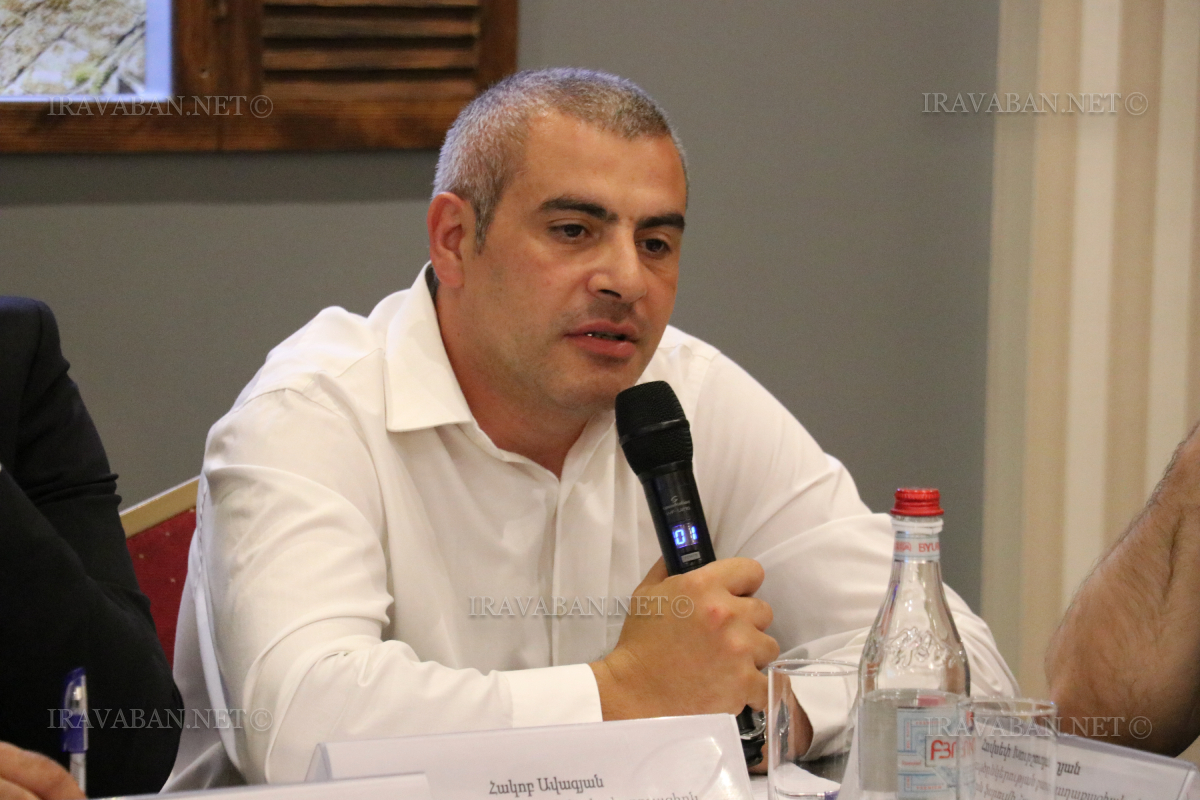
In his opening speech, Hakob Avagyan, the Chairman of the Governing Board of the CSO Anti-Corruption Coalition of Armenia, disagreed with Hovsep Khurshudyan’s observation that there is no systemic corruption in Armenia. According to him, it is still too early to make assessments.
“As Mr. Martirosyan Vice-President of the Union of Manufacturers and Businessmen of Armenia, presented clear examples, corruption is not only bribery with “cash” money. We see such cases in our daily life, for example, the head of an administrative body goes to a campaign in a state car. Is it corruption or not? If we begin to evaluate all this, it is as if we are returning to the years against which the struggle began. In addition, there are people sitting around the table who have dedicated half of their lives to public activities, and it is very important that we feel that we are heard,” Hakob Avagyan said.
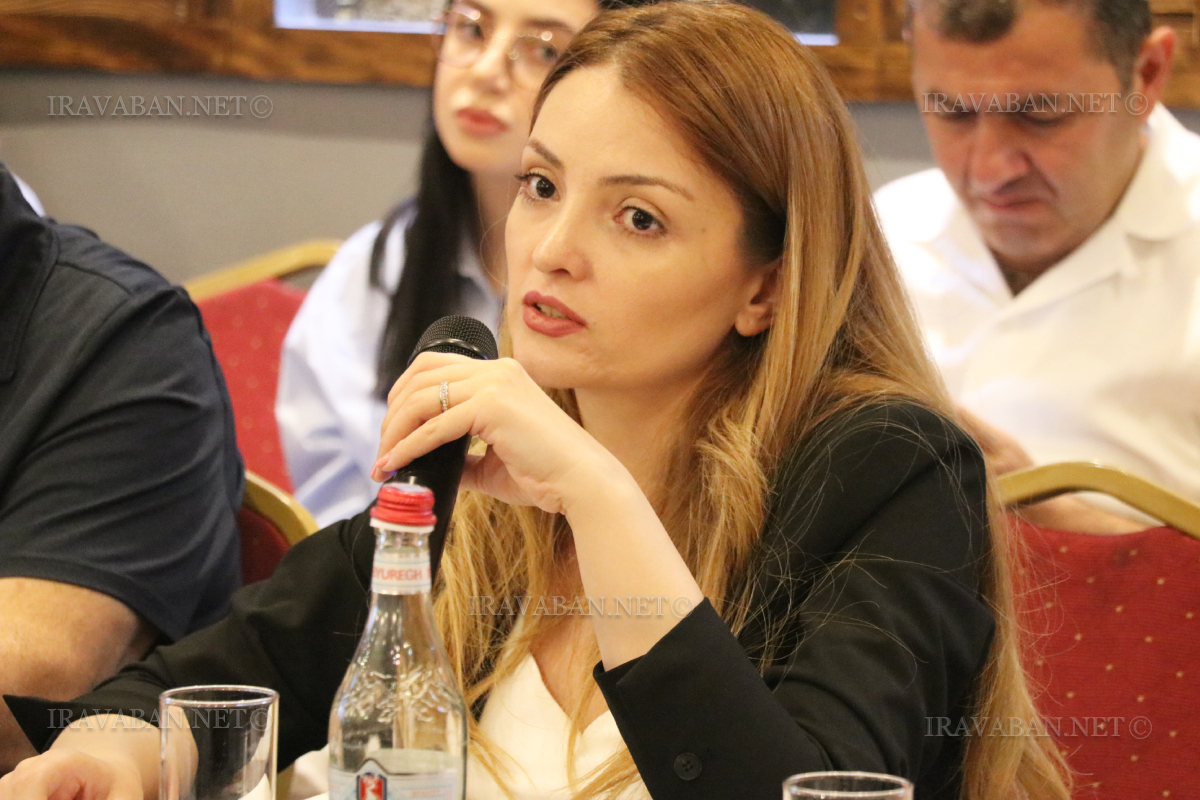
After the opening remarks, Hasmik Tigranyan, Acting Head of the Department of Anti-Corruption Policy Development and Monitoring of the Ministry of Justice, presented the Draft Anti-Corruption Strategy and the Implementation Action Plan deriving from it. According to her, actions will be carried out under 5 strategic goals. They are:
- Prevention of corruption,
- Combating corruption,
- Anti-corruption education and awareness,
- Business integrity, protection of business interests, facilitation of state-business administration,
- Improving the anti-corruption monitoring and evaluation system.
In the context of strengthening the structures, it is planned to adopt a unified law on the prevention of corruption, where all regulations will be included in one unified act. Rights protection mechanisms will be improved, considering it in the context of strengthening the HRD and educating the business sector so that the level of legal awareness increases, and they are aware which body they should apply to in case of a violation of their rights and be more consistent.
It is planned to improve the state procurement sector, ensure transparency and accountability, fair competition. Tigranyan also emphasized that citizens should also show intolerance to corruption and be consistent in order to raise such issues, as well as be demanding in respect of their rights.
The Head of the Department of Anti-Corruption Policy Development and Monitoring also referred to the institute of confiscation of property of illicit origin and noted that legislation should be improved to make it easier to return property of illicit origin located in other countries.
According to her, the possibility of introducing a “white list” in the framework of public procurement is being discussed currently, so that entities that have implemented anti-corruption mechanisms can promote it.
ALA President Karen Zadoyan responded to the speech of the representative of the Ministry and talked about the process of developing the anti-corruption strategy and the current situation. He mentioned that he wants to make an important record. “I want to reveal a secret to you. When the Anti-Corruption Policy Council met in Jermuk, it turned out that the Prime Minister of the RA, the chairman of the council, is not aware that we do not have an anti-corruption strategy, I spoke about it. After that, it was decided to create a working group to develop the strategy.
Karen Zadoyan also mentioned that the created working group was not aware of the development of the Action Plan of the strategy and learned about it when its development was already completed. According to him, the issue will be raised in the Anti-Corruption Policy Council.
“The strategy should be developed in a transparent and participatory manner. The working group formed for the development of the strategy should be aware of the process of developing the strategy action plan and no group should covertly attempt to develop a draft strategy; whether it is an NGO affiliated with the government or not. We will make these evaluations public,” he said.
The President of ALA also referred to the content of the strategy. According to him, there is no need for the volume of the strategy to be so large; there is no need for a 100-page document. According to Karen Zadoyan, the content part should be reduced by at least 2/3 and the important points should be included there. “Also, the strategy should talk not so much about the actions and achievements, but about the problems and challenges, presenting them in detail. Unfortunately, I did not get such an impression from that text. We have serious problems.”
Further the President of ALA presented several examples. The strategy does not refer to the most important issues regarding the institute of confiscation of property of illicit origin, such as: the presence of a case regarding property of illicit origin in the Constitutional Court; there is no reference to the opinion of the Venice Commission and the new decisions of the ECHR regarding the institute of other states, which may be groundbreaking for the judiciary practice of Armenia. “Apart from general judgments, we do not have a clear picture of the structure regarding the future fate of property of illicit origin. There is an unsuccessful attempt, the case of “Golden Palace”. The strategy should be about such serious problems, we will study the international experience, we will see how it helps us, that is how we will do it.
Then Karen Zadoyan referred to the criminal cases of corruption nature. He mentioned that there is no talk about the atmosphere of fear prevailing in the business sector; he offered to talk and have discussions with the representatives of the business sector. He also referred to the misuse of arrest as a preventive measure. “Detention should be used as an exceptional measure and a person should not be detained for months.”
According to the ALA Ppresident, the strategy does not mention the mistakes made in the process of forming institutional bodies.
“There are no talks about the fact that we threw aside the Competition Council, we make appointments in the Corruption Prevention Commission, then we bring back the system after the local and international statements and do not talk about it anymore…”
Karen Zadoyan also referred to the corruption perception index. According to him, when talking about the statistics, it should be said that the main problem was the overcoming of administrative corruption. “The number 54 we mentioned, we actually failed. We know that if it is 50 or more, then according to experts, it indicates the elimination of systemic corruption. If it is below 50, there is systemic corruption. According to statistics, we have systemic corruption in our country. We have to write down these problems so that the new goals set are realistic.”
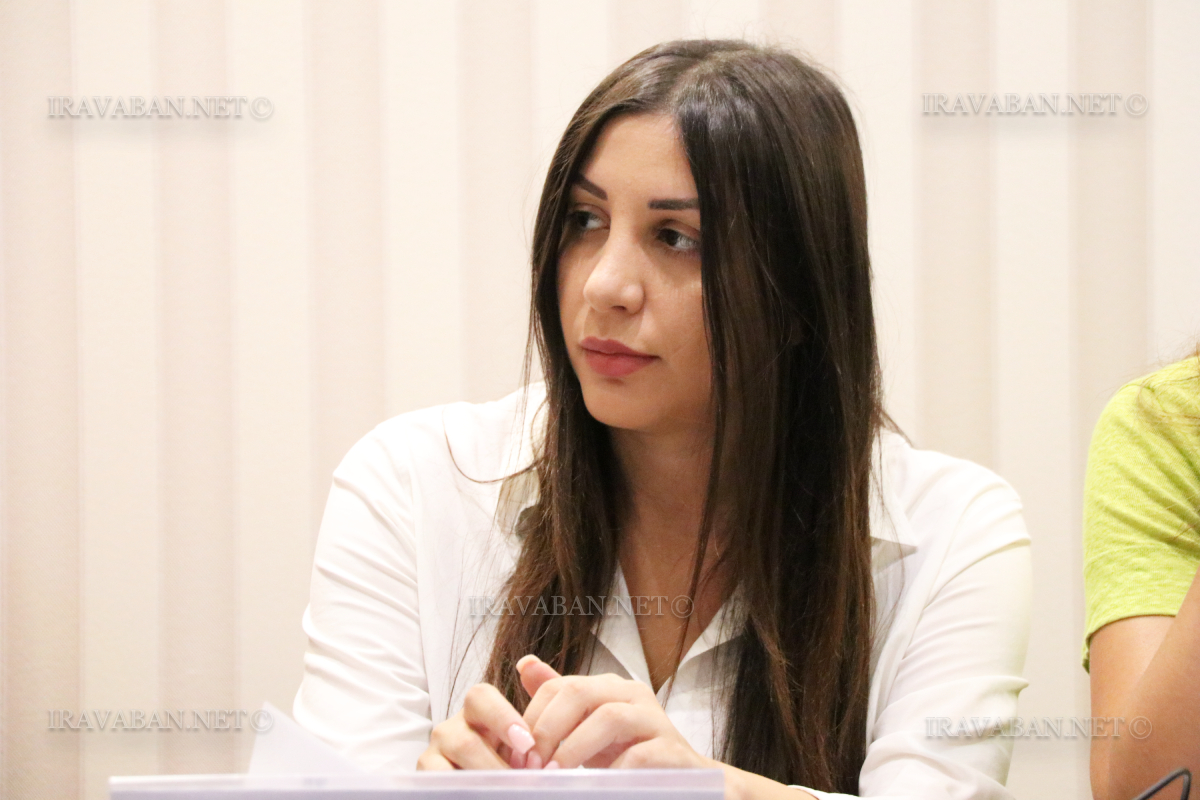
-
- performs function(s) aimed exclusively at the protection of whistleblowers and does not perform other duties,
- which has the supervisory function of receiving and examining complaints regarding cases of retaliation (harmful actions) against whistleblowers, as well as cases of failure to properly process reports submitted by external and internal reporting methods and violations of other requirements of whistleblower protection legislation,
- has the right to apply measures of liability or other measures to protect whistleblowers from retaliation (harmful actions) or to initiate their application in case of detection of a violation by a state or local self-government body, their official or organization,nti-Corruption Expert Mariam Zadoyan spoke about the 3 goals and directions of the anti-corruption strategy. They are:
- Prevention of corruption,
- Combating corruption,
- Business integrity, protection of business rights and facilitation of state-business administration.
One of the activities is intended to guarantee the anti-corruption expertise of draft legal acts: the expertise of the acts being developed (ex ante) and, if necessary, the expertise of the legal acts underlying them or related to them (ex post).
“We suggest introducing the accreditation system for anti-corruption expertise of legal acts, which is an international practice, in which the expertise is delegated to anti-corruption experts or specialized CSOs, which have passed special accreditation according to the procedure established by the state,” Mariam Zadoyan noted.
With one of the actions, it is planned to establish a unified system of applying measures of responsibility based on the violation of the elements of the integrity system.
“We propose to provide for the definition of measures of responsibility.
- by public servants supervising or managing other public servants, including those who are superior or direct managers, as well as by other officials responsible for the maintenance of integrity in general, by other public servants of the elements of the integrity system: for non-fulfillment or incomplete fulfillment of their assigned powers related to situational conflict of interest, restrictions of gift-acceptance, incompatibility requirements and violations of the rules for compliance with other restrictions,
- in case of disciplinary liability in relation to a number of offenses, definition of a clear measure of disciplinary liability to be applied,
- definition of measures of administrative responsibility of a material nature within the framework of a unified approach,” she said.
In addition, the expert suggests establishing a body responsible for ensuring protection of whistleblowers, in accordance with OECD standards, which
- performs function(s) aimed exclusively at the protection of whistleblowers and does not perform other duties,
- which has the supervisory function of receiving and examining complaints regarding cases of retaliation (harmful actions) against whistleblowers, as well as cases of failure to properly process reports submitted by external and internal reporting methods and violations of other requirements of whistleblower protection legislation,
- has the right to apply measures of liability or other measures to protect whistleblowers from retaliation (harmful actions) or to initiate their application in case of detection of a violation by a state or local self-government body, their official or organization,
- Also discuss such a comprehensive model, where the activities of the authorized body responsible for the whistleblowing system will include effective mechanisms for coordinating the professional activities of those responsible for whistleblowing, and for exercising control over their activities.
Deputy Minister of Finance Avag Avanesyan referred to the sphere of procurement and the challenges in it. He noted that it is necessary to reach a level, where purchases made from one person are rare.
“We hear a lot from the private sector that the procurement processes are complicated, it is not possible to ensure results with them, the minimum price is targeted, although there is no such thing in the law. It says “maximum result for compensation”. It is used to say that the procurement process is bad, let’s make it from “one person” to ensure results. We need to bring the legislation to a state that purchases from one person are made in exceptional cases,” the Deputy Minister said.
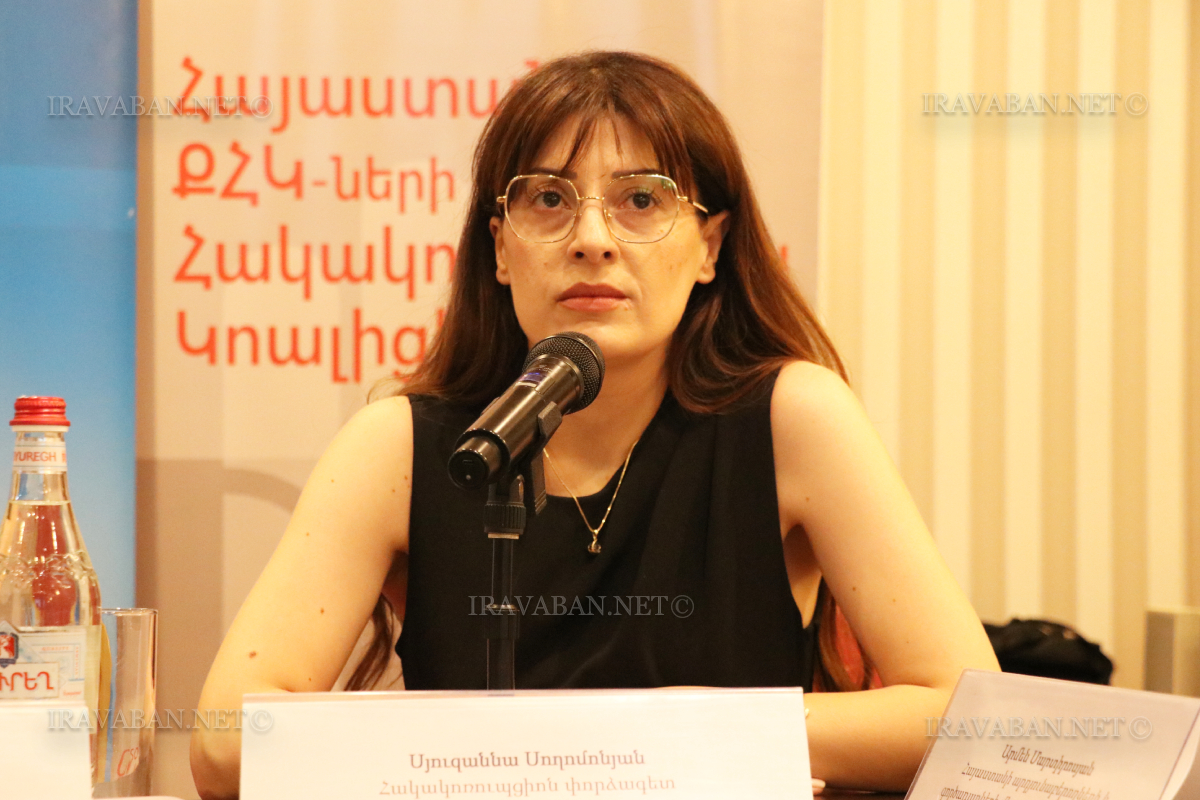
Anti-Corruption Expert Syuzanna Soghomonyan referred to 2 more goals included in the draft strategy. They are:
- Anti-corruption education and public awareness,
- Improving the anti-corruption monitoring and evaluation system.
According to the expert, Section I of the structure is dedicated to the current situation of the Anti-Corruption Policy. Contrary to the title, the preface of the section does not assess the current situation; it does not objectively reflect the real picture of anti-corruption activities in the RA and is limited to declarative sentences. The process of drafting the strategy and action plan was also not included in the draft.
Syuzanna Soghomonyan also referred to the structures of the improvement of public awareness. She mentioned that it is not acceptable when the main group of challenges, problems and omissions, due to which these works did not provide the desired and significant result, are not presented and there is no analysis of the lessons learned during the development of this strategic direction, which would be the basis for the strategic direction and the actions resulting from it.
“We propose to rewrite the content of the mentioned strategic direction and present the main challenges, problems and gaps in the field of public awareness that emerged during the implementation and evaluation of the fourth strategy, and also as a result of the monitoring (findings) made by specialized CSOs, emphasizing also the importance of changing the culture of the public regarding the whistleblowing system and the commitment of the Government in that regard, and placing the approach to solving these problems at the basis of this direction,” the expert noted.
Further, the participants made speeches and presented their observations on the draft strategy.
Arzuman Harutyunyan, President of the “Association of Audio-Visual Reporters” Public Organization, was the first to speak. According to him, until today, the Government has not adopted a single monitoring methodology, which should be used to evaluate the work done.
“Let me briefly touch on the issues of public awareness. The methods and mechanisms of presenting the activities of the anti-corruption sphere to the public do not meet the needs of the society. Anti-corruption activity is the demand of the society. It would be good for the Government to delegate that function to strong NGOs.”
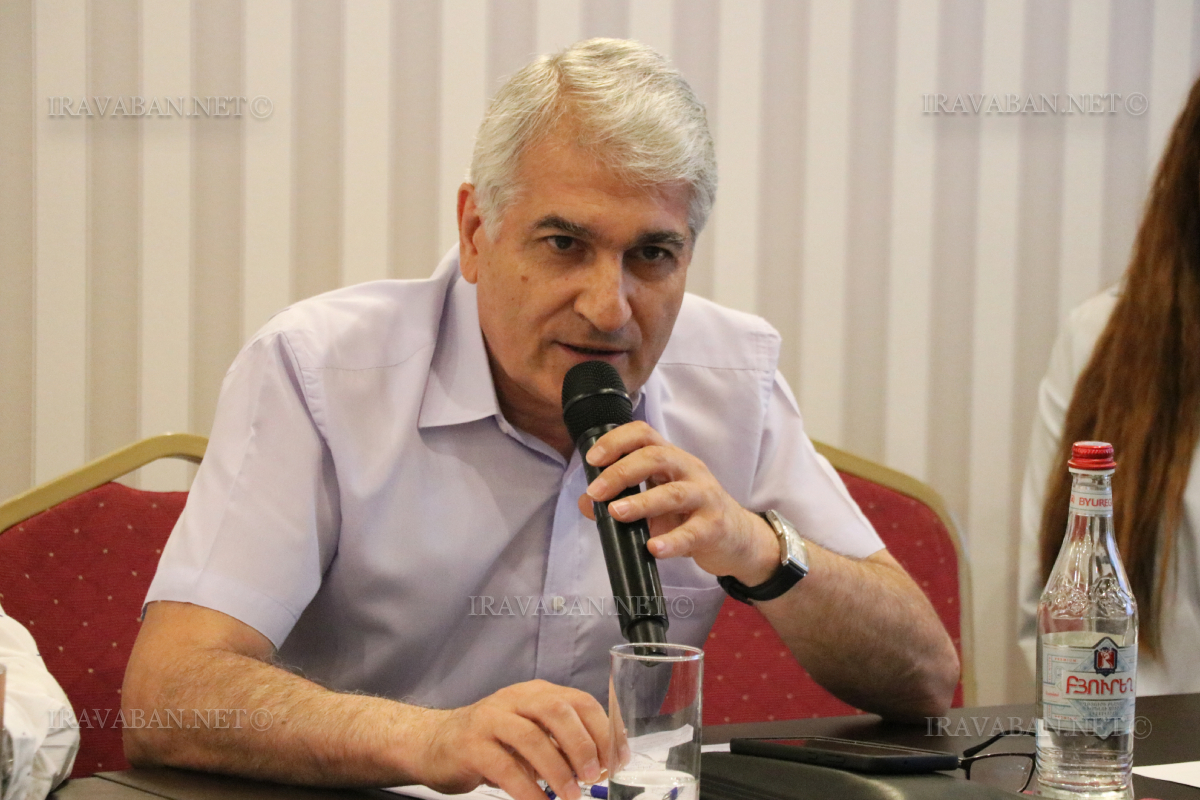
Gagik Makaryan, President of the Republican Union of Employers of Armenia, presented a series of observations, the first of which referred to the charter of universities. He proposed to include in them the idea that the acting rector does not have the right to make structural changes and reductions until the final elections of the rector. “Corruption risks are observed in similar cases.”
He also spoke about another problem. The presidents of the Governing Board of VET institutions (Vocational Education and Training) deliberately do not convene board meetings, because the composition of the board is not their preferred composition.
“Regarding public procurement: In these terms, it can be said that according to the legislation, more discretion is provided to the official. Purchases with a technical task may be considered completed, but in reality these purchases are “backward” purchases and do not meet current requirements. Here there is a waste of state resources and big risks of corruption,” Gagik Makaryan said.
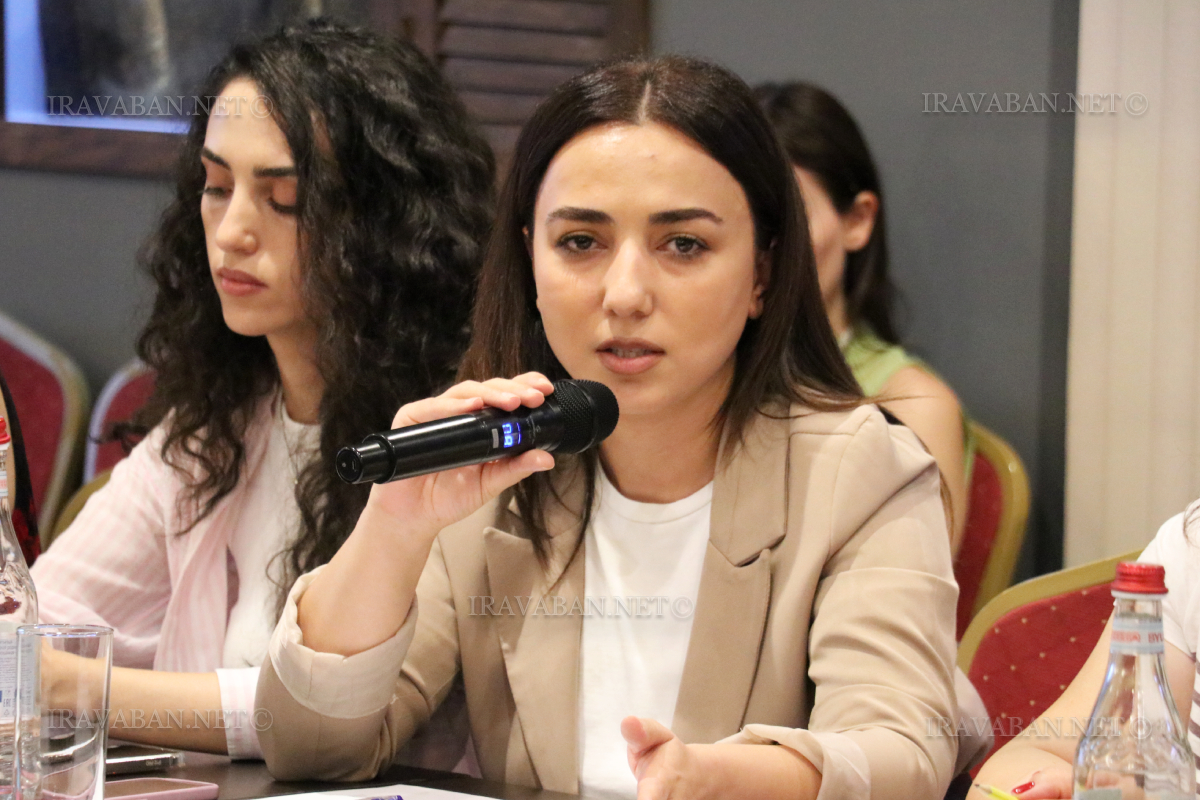
Tatev Asryan, Head of the Methodological Support Department of the Corruption Prevention Commission, in her speech mentioned that the Commission has developed and submitted its draft proposal to the ministry, and also asked to circulate it within the working group.
“Regarding the issues presented under the thematic group of corruption prevention, I should mention that one of the areas under my department is the anti-corruption expertise of legal acts, which is the assessment of corruption risks in legal acts and their drafts. Of course, I am not against cooperation with representatives of the civil society, but we know that in international practice it is an important element of the prevention mandate and, as a rule, the units that assess corruption risks deal with it,” Tatev Asryan said.
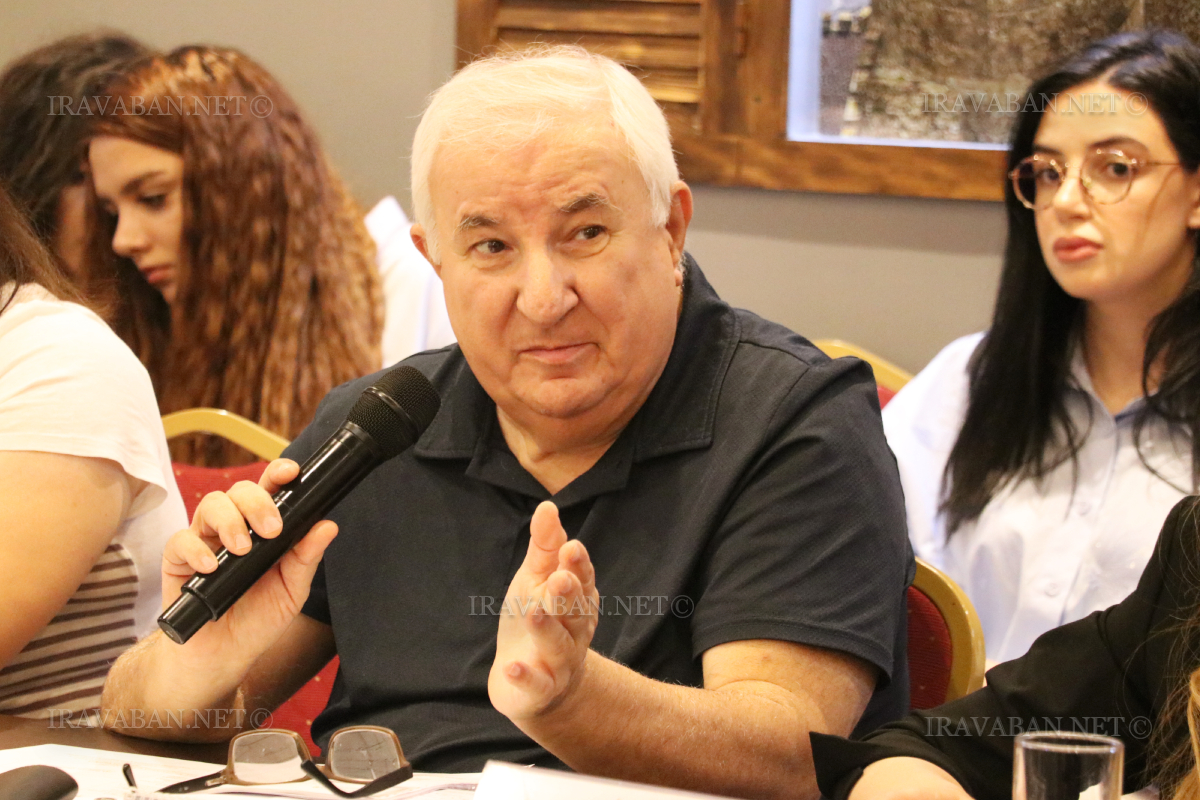
Movses Aristakesyan, Member of the Governing Board of the CSO Anti-Corruption Coalition of Armenia, presented his observations on the draft strategy. He mentioned that earlier he submitted 23 proposals on the e-draft platform and is waiting for the Ministry’s response to them.
“It is written in the draft, “to confirm. … the “Financial Assessment of the 2023-2026 Action Plan arising from the Anti-Corruption Strategy of the Republic of Armenia, according to Annex 3”. However, this Annex 3 is not on the official website of the Ministry of Justice, as it was before. In this case, the civil society cannot evaluate the financial results of the implementation of the strategy and action plan both when giving an opinion on the proposed drafts and during its alternative monitoring.
Therefore, we suggest posting the Annex 3 regarding the “Financial Assessment of the 2023-2026 Action Plan arising from the Anti-Corruption Strategy of the Republic of Armenia” on the official website,” Movses Aristakesyan said.
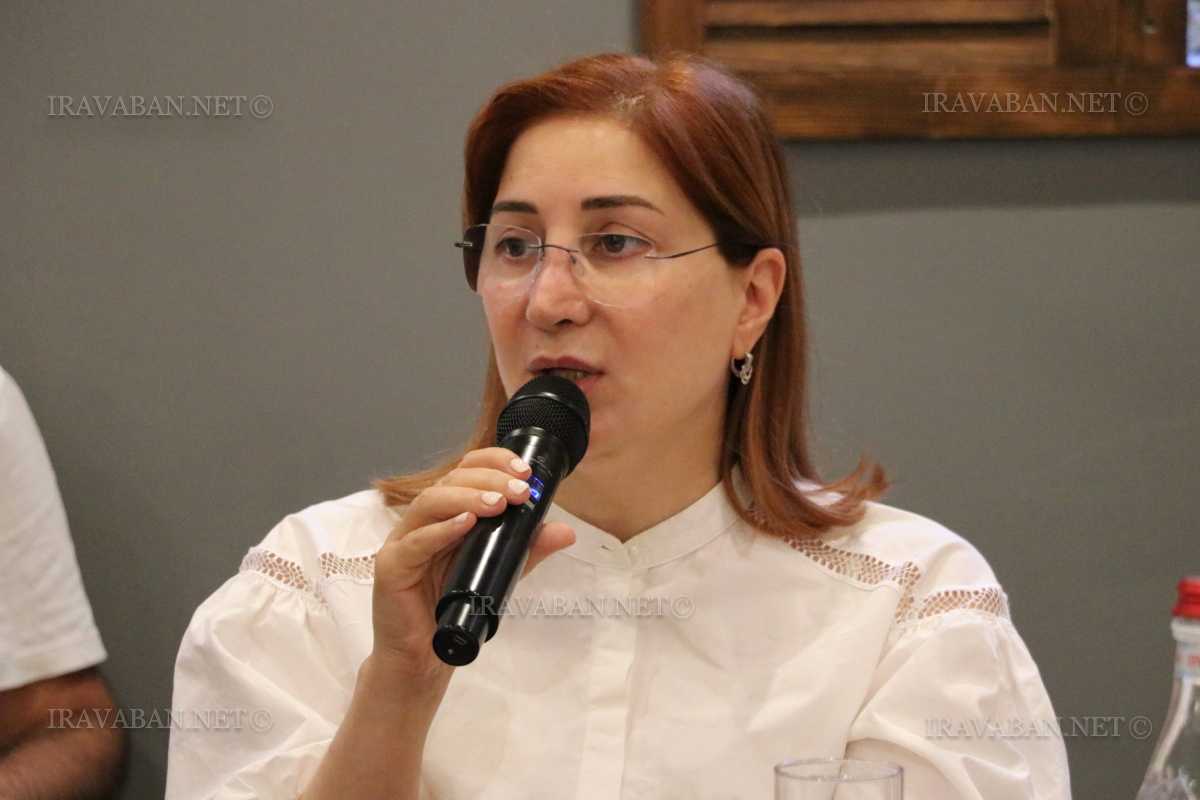
Liza Grigoryan, Judge of the judicial staff of the Anti-Corruption Chamber of the Court of Cassation, was present at the discussion as well. She noted that training is necessary not only for specialists, but for the staff of NGOs as well.
“And in this light, it is necessary in addition to writing about the implementation of training in the Strategy, to indicate the number of persons trained in each field and whether they are able to apply the given law after training. And thus, the result of the given trainings should be shown. We must make sure that the action will not be of a formal nature and we will have measurable indicators,” the judge says.
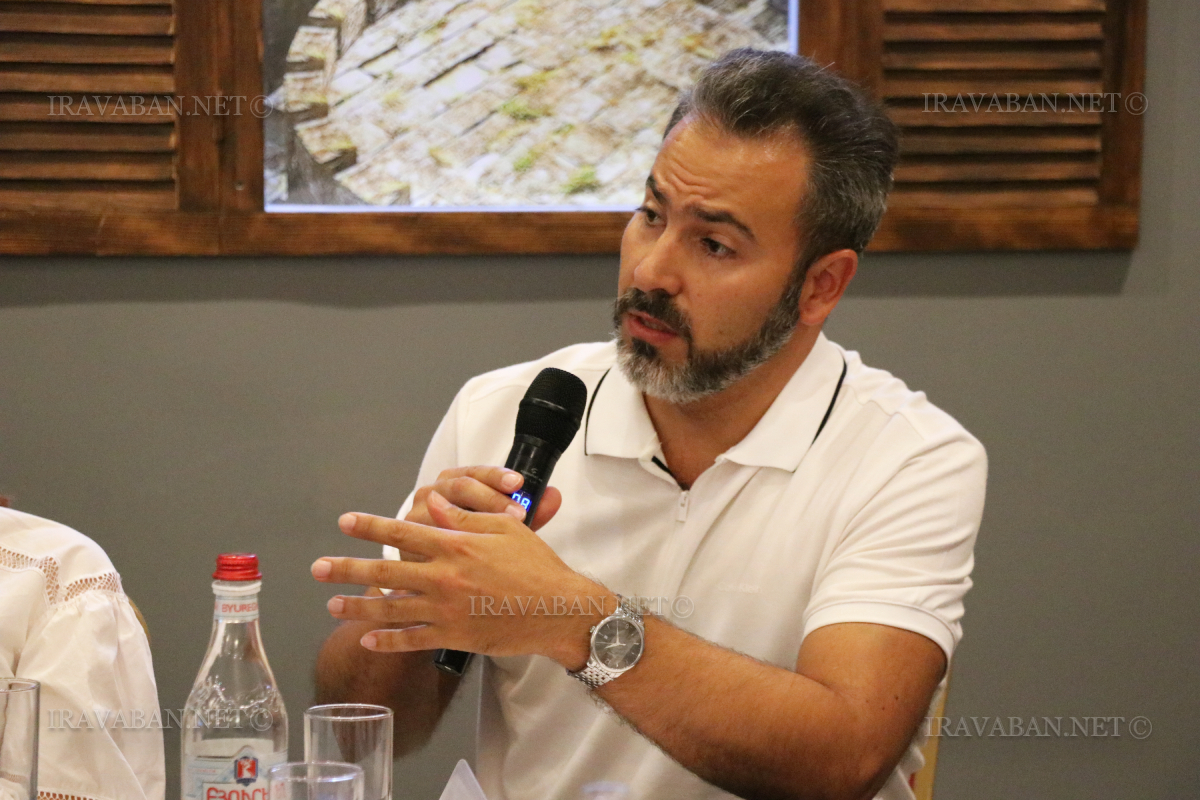
Tigran Yegoryan, a representative of the “Europe in Law Association” NGO spoke about the importance of such discussions.
“The state should take clear steps at the strategic level to develop the resources of the internal state and civil society and achieve results with these means,” he said.
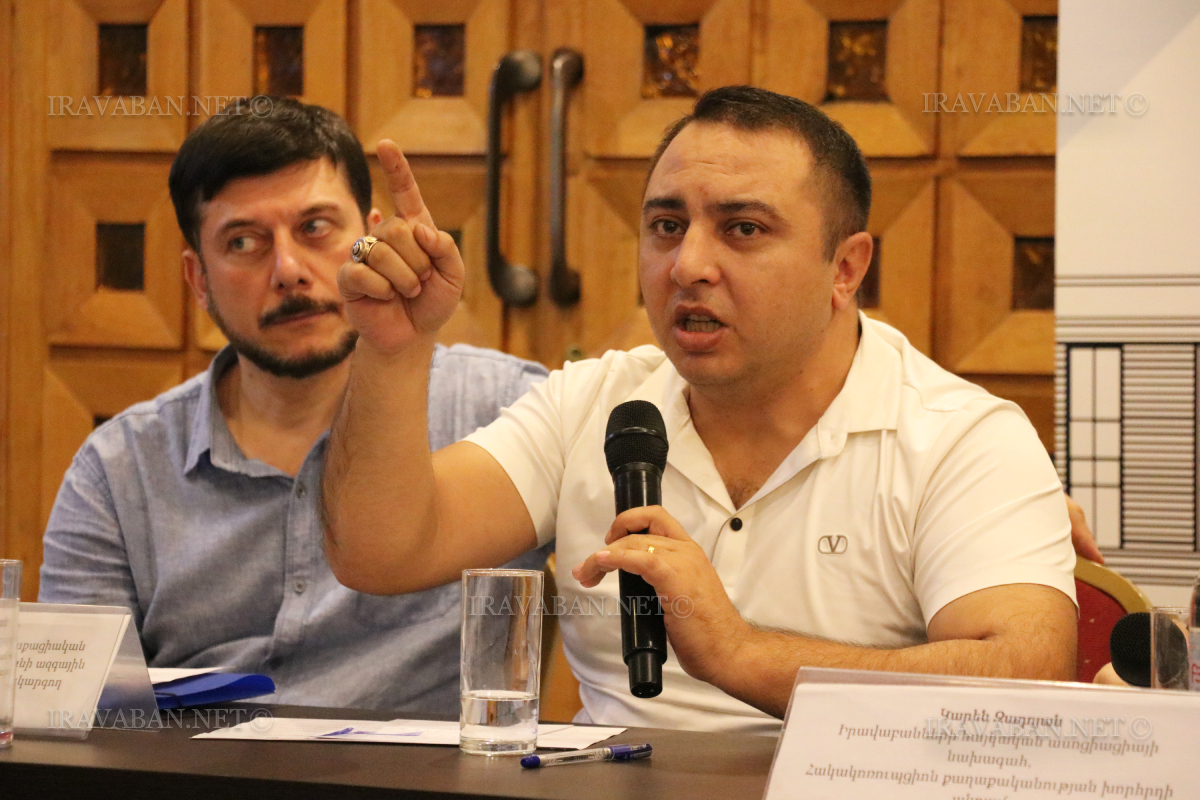
Arkady Sahakyan, Member of the Governing Board of the CSO Anti-Corruption Coalition of Armenia, suggested that anti-corruption topics should be included in the educational programs of higher educational institutions, particularly in the law faculties.
“In addition, every 3 years the strategy should be revised. In this period of rapid technological development, there may be cases when resources are planned for the implementation of a given action of the strategy, the need for which is no longer there. Therefore, it is very important to regularly update the strategy, keeping pace with technological development,” Arkady Sahakyan said.
After the speeches were over, Hasmik Tigranyan, Acting Head of the Department of Anti-Corruption Policy Development and Monitoring of the Ministry of Justice, responded to them.
She mentioned that in connection with awareness issues the Whistle-blowing Awareness program is currently being developed, and the Anti-Corruption Awareness program will be developed next, which will be implemented through cooperation with NGOs.
“A separate Communication Action Plan will be developed, and a unified methodology of surveys also will be introduced with this strategy, which will help to raise and collect a number of issues,” she said.
The recommendations made as a result of the discussion will be collected and presented to the Ministry of Justice.

